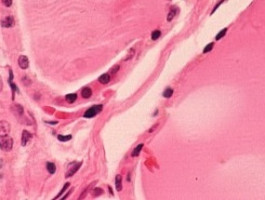
T-follicular helper (TFH) lymphoma is a blood cancer subgroup that continues to demonstrate a generally poor prognosis, with no standard treatment established to date.
Although specific genetic mutations are frequently observed in this disease, the association between genomic abnormalities, and clinical features and prognosis remains unclear.
In this study, 94 cases of TFH lymphoma and 35 cases of peripheral T-cell lymphoma, not otherwise specified (PTCL-NOS), a related disease, were analysed using whole-exome sequencing.
From 35 frequently occurring genetic abnormalities, three molecular classifications (C1, C2, and C3) were identified.
C1 and C3 shared mutations in epigenetic regulators recognised in TFH lymphoma, with RHOA G17V mutations commonly observed.
However, C3, characterised by chromosome 5 amplification and IDH2 mutations, was associated with a worse prognosis than C1.
C2 mainly consisted of peripheral T lymphomas, not otherwise specified, with chromosomal aneuploidy and TP53/CDKN2A abnormalities.
It also included some TFH lymphomas and had a poor prognosis.
Additionally, RNA sequencing analysis classified the tumour microenvironment into three types: TME1, TME2, and TME3.
Of these, TME2, marked by increased M2 macrophage fraction, was linked to poor outcomes and overlapped with C2 in many cases.
In conclusion, this study clarified the molecular characteristics of TFH lymphoma, particularly in cases showing a poor prognosis.
These research findings are potentially useful for optimising TFH lymphoma treatment and may serve as a basis for the development of new treatment strategies.
Title of original paper: Discrete genetic subtypes and tumour microenvironment signatures correlate with peripheral T-cell lymphoma outcomes, found in the journal Leukemia.
Source: University of Tsukuba
We are an independent charity and are not backed by a large company or society. We raise every penny ourselves to improve the standards of cancer care through education. You can help us continue our work to address inequalities in cancer care by making a donation.
Any donation, however small, contributes directly towards the costs of creating and sharing free oncology education.
Together we can get better outcomes for patients by tackling global inequalities in access to the results of cancer research.
Thank you for your support.